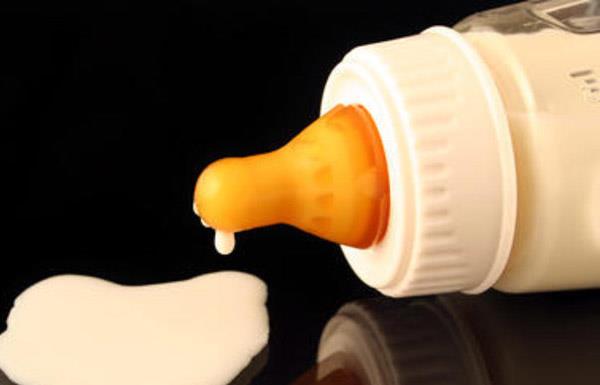Although she really wanted to let her breastfeed her baby, but because the "source" was very few, the mother had to choose an option for external breastfeeding. So there is nothing wrong with joking that formula is the "adoptive mother" of some babies. When looking to buy formula milk, mothers need to consider the form and ingredients of the milk such as protein, carbohydrates and other nutrients. Ideally, mothers should choose the milk that best suits the baby and financial conditions.
Currently on the market there are many types of formula for you to choose from. How to choose the right milk for your baby from a variety of brands is the most important thing you need to keep in mind.
.
1 / What are the forms of formula milk?
There are 3 types of formula: Prepared milk, condensed milk and powdered milk.
Prepared milk is definitely the most convenient. You do not need to measure or mix anything, just open the lid and let the child drink immediately. This milk is hygienic and is especially convenient when you do not know where to find formula. Prepared milk is about 20% more expensive than powdered milk. Milk cartons also take up more space in your cupboard and in your trash can.
Prepared formula after opening only lasts 48 hours. And this milk also has a slightly darker color than powdered milk so it is easy to leave stains on baby clothes.

Have you chosen the best milk for your baby?
For concentrated formula milk , you need to mix it with water. The ratio of milk to water is usually 1: 1, but remember to always read the instructions on the box carefully! Compared to the premix, condensed milk is cheaper and less bulky. However, this milk is still more expensive than formula.
Powdered milk is the most economical and environmentally friendly choice, taking up less shipping space and location in your cabinet and trash bin.
Powdered milk takes longer to mix than other formulas and you have to follow the instructions exactly. This milk can be kept for 1 month after opening. Just like condensed milk, you can prepare your baby to drink with a flexible dosage when needed, especially convenient if you are breastfeeding but still need to feed your baby with formula.

Small notes when preparing formula In addition to making formula according to instructions and keeping hygiene, mothers should "invest" time with them until their children enjoy all their drinks.
MarryBaby's advice: The chemical bisphenol A (BPA) is usually found in milk cartons. Canned condensed milk still contains a small amount of BPA. Powdered milk alone is considered a safer option because it contains very little BPA.
2 / Should I change milk for my baby?
Formula milk meets almost all of your baby's needs. The first time he breastfed, he could not digest very well. But then your baby will show that he likes a certain type of milk and you don't have to change your baby's milk.
Problems like vomiting, flatulence, or stomach upset are not usually caused by the child's milk or diet. When children grow up, the digestive system will develop more completely and overcome those conditions.
You should try a formula for at least 2 weeks for your baby. Then, if your baby's digestion still does not improve, you should consult your doctor before changing milk.
Formula milk, in particular, is much more expensive but does not differ significantly in terms of its important nutritional values. During the first 6 months of life, a newborn 's digestive system will continuously improve and adapt better. Very few babies really need this expensive formula. If you think a particular type of milk might be good for your baby, consult your doctor before buying more to store.

When choosing milk for your baby, you should pay attention to the nutritional value in milk
3 / How are the different types of formula?
Formula milk has 6 main ingredients: Carbohydrates, proteins, fats, vitamins, minerals and other nutrients. It is the content of carbohydrates, proteins and added ingredients that make the difference between many formula brands. For example, whey protein and casein protein in cow's milk are always combined in separate proportions to produce different types of milk.
4 / Does brand milk guarantee nutrition?
Formula brands generally must meet stringent nutritional requirements. The only difference between dairy brands is the price. When choosing to buy milk regardless of brand, you should also read through the information on the packaging. Each brand will have different nutritional ingredients in its formula. So choose the one that best suits your child.

Infant formula Breast milk is the leading food source for babies, but for many reasons, some babies are unable to breastfeed or their mothers do not have enough breast milk. In these cases, infant formula will also provide sufficient nutrition if properly prepared
5 / Is it possible to add cereals or milk to baby formula?
Never add any ingredients, including vitamins, grains, fatty acids, olive oil or cow's milk, to your baby's formula, unless directed to do so by a doctor. Carefully refined formula milk with dozens of nutrients measured at the correct dosage, anything added can be dangerous to your baby's health .
Olive oil, for example, will lead to permanent lung damage, and even death from inhaling oil into the lungs when babies vomit. Cow's milk is difficult to digest for children, you should not mix it with formula or give it directly to children under 1 year old. And adding breastmilk to formula will only waste breastmilk if the baby doesn't finish the bottle.
You should monitor any child's reactions and notify your doctor if any unusual symptoms occur. Do not self-diagnose any signs of allergies or hypersensitivity in your child, as you could overlook a potentially serious risk, or prevent your child from getting enough nutrients.
>>> See more discussions with the same related topic:
Will expressing breastmilk in a bottle cause the baby to stop breastfeeding?
Baby often fart, is it because the digestive system is not good?















